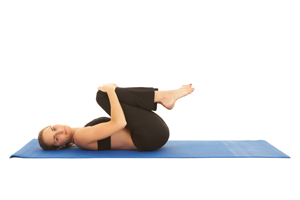 Many people consult a doctor of chiropractic when they are experiencing back pain, which is a good idea, because back pain – especially if chronic – can be a symptom of more serious structural problems that should be treated before they become worse. But there are proactive steps you can take to prevent back pain in the first place, and one of them is adding a regimen of simple back stretches to your day.
Many people consult a doctor of chiropractic when they are experiencing back pain, which is a good idea, because back pain – especially if chronic – can be a symptom of more serious structural problems that should be treated before they become worse. But there are proactive steps you can take to prevent back pain in the first place, and one of them is adding a regimen of simple back stretches to your day.
Daily activity – not just activity per se but also sitting or standing for long periods of time – can put strain on the muscles of your back and cause them to become tight and inflexible. Over time this can lead to bigger problems, as these overly tight muscles pull your vertebrae and joints out of alignment and thus exert pressure on the nerves of your spinal cord and extremities. Stretching can help to prevent this. The Mayo Clinic lists the five most important benefits of regular stretching as: increased flexibility and range of motion, better posture, improved circulation, enhanced coordination and stress relief.
Following are four simple stretches that are beneficial to your back. Use your doctor’s recommendations and your own research to add to the list:
- Lower back – Lie on your back and place one hand over each knee to pull them gently towards your chest, and hold the position for 30 seconds. A variation of this stretch is to stay in this position and roll to the right and the left, bringing your knees as close to the floor as is comfortable. Repeat 2 to 3 times on each side.
- Lower back – This is often called the “cat stretch.” Kneel on the floor with your hands at shoulder width and knees at hip width. Start with your back flat and parallel to the floor, but then gently arch it upwards as high as is comfortable, while pulling up with your stomach muscles. Repeat as often as is comfortable. As a variation, alternate the upward stretches with a downward stretch, arching your abdomen towards the floor.
- Upper back – Stand, raise your arms out in front of you and interlock your fingers. Then rotate your hands so that your palms are facing away from your body, and push out gently. Repeat 2-3 times, holding for 30 seconds.
- Upper back – Sit on a chair and stretch your hands in front of you, fingers interlaced as in the previous stretch. As before, rotate your hands, but then this time contract your stomach muscles and lean forward, arching your back as if you were stretching it over a large exercise ball. Hold for 30 seconds and repeat 2 to 3 times.
If you do not stretch regularly, check with your doctor before undertaking any new exercise program. As you begin to practice them, keep a few simple rules in mind. First, always warm up before stretching by walking or moving around. If you are adding back stretches to an existing exercise routine, perform them both before and after exercising. While stretching, hold each position for at least 30 seconds to give the muscles time to stretch out and relax. Don’t bounce or strain; stretching should be pain- and effort-free to be effective. Stretch both sides of your body equally, and remember to breathe normally; if you find yourself holding your breath or panting, you’re trying too hard.


